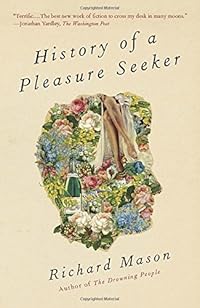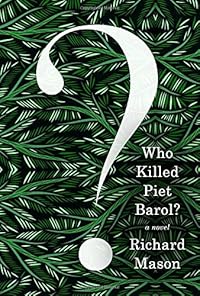« older | Main Largehearted Boy Page | newer »
January 26, 2017
Book Notes - Richard Mason "History of a Pleasure Seeker" & "Who Killed Piet Barol?"
In the Book Notes series, authors create and discuss a music playlist that relates in some way to their recently published book.
Previous contributors include Bret Easton Ellis, Kate Christensen, Lauren Groff, T.C. Boyle, Dana Spiotta, Amy Bloom, Aimee Bender, Jesmyn Ward, Heidi Julavits, Hari Kunzru, and many others.
Richard Mason's latest novel Who Killed Piet Barol? is a worthy successor to the much lauded History of a Pleasure Seeker.
Publishers Weekly wrote of Who Killed Piet Barol?:
"With echoes of Paul Theroux’s Mosquito Coast, Mason unspools a story rich in detail and populated with deeply flawed characters whose lives intersect in the once-pristine forest that inspires acts sacred and profane. Mason handles multiple story lines with the élan of a seasoned raconteur."
In his own words, here is Richard Mason's Book Notes music playlist for his novels History of a Pleasure Seeker and Who Killed Piet Barol?:
Music is at the heart of everything I write. So much so that the shape of a piece of music has sometimes inspired whole characters, or the events of an entire novel. Particular pieces of music – the impact they make when you hear them – are catalysts for major plot developments. Sometimes they reveal to me who a character is, or what their marriage is like. I’m a musician, and playing the piano is one of the ways I keep my creativity alive. It’s often while learning a piece, getting right to its core, feeling it in my body, that my mind wanders off and creates new worlds.
I was drenched in music when the character of Piet Barol came into my head. I had been reading about the opulent liners of the early twentieth century, and thinking about furniture, and forests, about the way trees are known to care for their young. As these ideas swirled, a young man came into being: a man who comes from nothing, and is determined to have everything. A man bold enough to trust his intuition, and take outrageous risks in pursuit of pleasure and adventure. A man not quite in control of his own charisma, or the impact it has on others.
I had bought a ticket to Carmen at the Royal Opera House in London. I knew some arias in Bizet’s famous opera, but I’d never seen the whole thing. I was entranced. Carmen tells the story of a man who falls in love with a woman he hardly knows, and builds her up to be very different from the person she actually is. The trauma of his disappointment leads to tragedy. It’s such a human story. As the curtain rose for the second act, the music cast a powerful spell on me. The opera house shrank, became the first class nightclub of the world’s most glamorous ship. I thought: This character is going to end up in First Class, somehow, on a voyage to a distant corner of the earth. He’s going to watch Carmen, and make a decision about the kind of woman he wants to marry. He’ll promise himself not to make Don José’s mistake, but to find a life mate who understands him.
That night, I came home and wrote 30 pages of notes. Ten years later, two novels are written: History of a Pleasure Seeker and Who Killed Piet Barol?
Here is there playlist:
Bizet’s Symphony in C Major, First Movement
Start the book listening to the first movement of Bizet’s Symphony in C Major. He wrote it when he was 16. Make sure you listen to a recording that takes the music fast – too many conductors take it slow, and lose all its bubbling optimism. It’s the music of a young man on the make, who trusts that life will treat him well.
Chopin’s Nocturne Number 2, in E Flat Major, Opus 9, No.2
Piet’s mother was a music teacher, and she taught him that the only key for love is E Flat Major. He ends up in a situation where he needs the support of an attractive middle aged woman, who hasn’t had sex in ten years. He decides to drench her in this Chopin Nocturne. Learning to play it was one of the highlights of writing this book, and gave me insights into an entire family – their loves, challenges, and secrets. I challenge anyone, man or woman, not to be seduced by the spectacle of an attractive person playing this gorgeous, tender, piece of music.
Entr’act to the third Act of Carmen
Also in E Flat Major, and redolent of adventure. From the novel: “As he played, he thought of the smugglers who appear on stage at its close, whispering that fortune awaits if only they will tread carefully. This was exactly how he felt as he drenched is quarry in sweet, permissive magic.”
J.S.Bach’s Prelude No. 2 C Minor, BWV 847
When I was writing my second novel, Us, I learned to play this dark, addictive Prelude. Its repeating patterns trap you, almost compel you to keep playing. And the final note, in my edition, is in a different key – the “wrong” key – which makes it almost impossible not to start from the beginning again as soon as you finish.
Years later, when I was thinking about the character of Egbert Vermeulen-Sickerts, a ten year old boy in the grip of a musical OCD compulsion, whom Piet Barol is hired to tutor, I thought: Egbert will get trapped in that prelude, like I did.
Lilas Pastia from Carmen
The aria when Carmen promises Don José she’ll take him dancing on the ramparts of Seville. Piet sings it in an entirely different context, in a high falsetto. “Yes, but it’s dull to be alone… True pleasure requires a pair.” Carmen’s words to Don José set a fire in Piet’s world too.
Bruno Bertoli’s “Can Can”, in the style of the 1890s. Performed by Bruno Bertoli and his Salon Orchestra
There’s a huge party, a 22nd birthday party given by Europe’s wealthiest hotelier, in History of a Pleasure Seeker. When I was writing it, I found old 78 LPs from the earliest years of the gramophone and listened to them (on an old gramophone player) obsessively. They’re wonderful, but not available anywhere that I can find except for my own collection. This is a great substitute, and goes with the line “The music was modern, and wildly glamorous.”
“E lucevan le stele” from Tosca, by Giacomo Puccini
This is one of the most haunting love songs ever written – a letter from a man condemned to death, to the woman he loves. Piet sings it, accompanying himself on the piano, and in the course of doing so … makes his gravest mistake.
Chopin’s Fourth Ballade in F Minor, Opus 52
This is one of the most profound pieces of music ever written. It is totally beyond my abilities to play, and I listened to Spencer Myer’s wonderful recording. If ever a piece of music could free a person from his demons, this is it.
This book finds Piet Barol in Cape Town in 1913, impersonating a French aristocrat, and down on his luck. It concerns the risks he takes to get back on his feet, and make a major work of art.
Although the book opens with Piet and his wife Stacey navigating the white world of Colonial South Africa, most of the action takes place when he heads off into the hinterland with two young Xhosa men – Ntsina, raised in the Xhosa spiritual tradition, whose grandmother is the witchdoctor of Gwadana Village, and Luvo, a fellow Xhosa and devout Christian, raised by German missionaries.
God Save the King
One of Piet’s first missions is to persuade Percy Shabrill, a mining magnate, to get rid of all the furniture he has ordered for his new mansion, and commission a new set from Piet – who’s now a furniture maker. Percy sings God Save the King, the British National Anthem, as often as he can, as loudly as he can. It’s a stirring tune by Purcell, and takes you right back to the British Empire’s golden age.
Hlani Ngendawo Zenu
When Piet sets off on a great journey towards the fabled forest of Gwadana, he takes the bus with his new Xhosa companions – and everyone starts singing. To write this book, I lived for a year in a tent on a hillside in the rural Eastern Cape, working with a Xhosa community to build a rural business school and getting deep into the politics of the region. (See https://www.youtube.com/playlist?list=PLt4nSwIUNn_VsG6aZThjlD_U-s_y7mEyt)
Xhosa music is amazing. But it’s a communal act. One villager starts singing. Soon everyone joins in, harmonies building. Songs can last for hours. This is the only example I can find on Spotify, but it gives you some idea.
Big Rain Drops on a Metal Roof
Not a piece of music per se, but musical – and magical. As I did, Piet builds for himself a hut with mud walls and a tin roof. To sleep in such a building during an African rain storm is a wonderful thing.
Forest Sounds at Dusk
Again, not a piece of music, but a snatch of the music of a great forest. Piet and his companions venture into the Forest of Gwadana, a piece of ancient forest that contains the Xhosas’ revered Ancestor Trees. These trees are 2,000 years old, and were inspired by the Redwoods of California.
Leave Right Now, by Will Young
This is totally out of the period, but I listened to it often when writing an important scene – a wedding that goes disastrously wrong. A Xhosa bride, Bela, the best brought-up girl in Gwadana, appears from the Bridal hut and approaches her new husband. Something in this song helped me get into the heads of her parents, who are bursting with pride as they watch their daughter – the epitome of grace and innocence. It’s not about the words, and I can’t explain why this song moved me like it did, but it did.
Pergolesi Stabat Mata – Quis Est Homo, Qui Non Fleret
The novel is called Who Killed Piet Barol? but this isn’t a straightforward question with a straightforward answer. All I can say is: As Piet climbs the ladder, listen to this.
There’s a wonderful multimedia edition of History of a Pleasure Seeker that contains all the music, at the right places. Search History of a Pleasure Seeker on the App store.
Richard Mason and Who Killed Piet Barol? links:
Kirkus review
Publishers Weekly review
And the Plot Thickens interview with the author
also at Largehearted Boy:
Support the Largehearted Boy website
List of Online "Best Books of 2016" Lists
Book Notes (2015 - ) (authors create music playlists for their book)
Book Notes (2012 - 2014) (authors create music playlists for their book)
Book Notes (2005 - 2011) (authors create music playlists for their book)
my 11 favorite Book Notes playlist essays
100 Online Sources for Free and Legal Music Downloads
Antiheroines (interviews with up and coming female comics artists)
Atomic Books Comics Preview (weekly comics highlights)
guest book reviews
Librairie Drawn & Quarterly Books of the Week (recommended new books, magazines, and comics)
musician/author interviews
Note Books (musicians discuss literature)
Short Cuts (writers pair a song with their short story or essay)
Shorties (daily music, literature, and pop culture links)
Soundtracked (composers and directors discuss their film's soundtracks)
weekly music release lists







